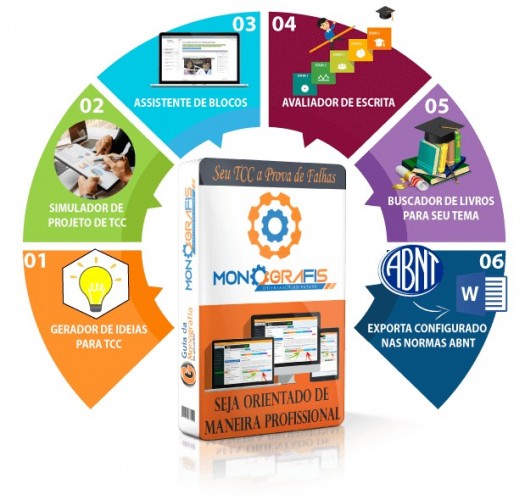Now in this text we will be sharing a list full of Project Ideas and suggestions for Capstone and Thesiss of Psycho-Pedagogy. The list also discloses suggestions for other types of academic work such as abstracts, scientific articles and many others. I hope you make good use of this list of Project Ideas for academic work in formation in Psycho-Pedagogy.
The selection of the PsychoPedagogy theme is the most significant decision that the academic needs to make for a good development of the Thesis and Capstone, which ends up generating a lot of anxiety and doubts.
Among the numerous options for topics for Capstone or Thesis, a good choice will ensure that the student elaborates his Research Paper Topics Ideas with much more aptitude and less stress.
First, before we start the list of suggested topics for the Psycho-Pedagogy Capstone, I intend to suggest tips to support your Capstone.
We then recommend seeing our post on: Pedagogy Capstone and Theses Project Ideas
Pay someone to Create your Academic PsychoPedagogy Work
Have you heard of StudyBay Brasil? It is a platform where the student can negotiate with teachers and other graduates to compose their academic works of many types such as scientific article, writing, Research Paper of Psycho-Pedagogy or any other training. You can put an end to any stress of doing an academic PsychoPedagogy job by spending no time.
With Studybay you can create ABNT, Power Point Presentation, File, Research Paper, PIM - Integrated Multidisciplinary Project, Portfolio, Questions and Exercises, Review (Criticism), Summary, Doctoral Thesis, Mathematics Work, Translation and many others. In fact, you can also generate money by doing work for the thousands of students who access the StudyBay website daily, including accesses from around the world.
All you need is to click on the link below and make a budget showing the type of project you want to pay to do. They can also help you in developing a theme. It works as a website to hire freelancers, you receive quotes of different values and you are fully insured by the StudyBay Brasil website, a company in many languages that has landed in Brazil to help you with PsychoPedagogy work.

Monografis - Doing your Psycho-Pedagogy Research Paper faster
If you do not intend to hire someone to produce your Psycho-Pedagogy Capstone or Research Paper, a recommendation is to use a program that will support the preparation of your Psycho-Pedagogy Research Paper and Capstone. Such a program helps in the creation of your Research Paper, ending all hard work and delivering in the way that the bank prefers to receive.
We advise the software called Thesiss Capstone Advisor, it is a program capable of helping you to do your Term Paper and Research Paper and any other work in a perfect way, making you get the best grade.
Theses, dissertations and thousands of other projects can be done quickly with the help of a Research Paper that helps you with Project Ideas, simulates the Capstone project on your device, helps with the creation of blocks, analyzes your writing, searches for books and sources for your Capstone and exports complete and configured in updated ABNT standards.
If you are afraid of the platform, we recommend knowing at least the Theme generator for Capstone and Thesiss free that the Monografis Orientador Platform provides.
Tips for Academic Works of PsychoPedagogy
See now tips for making your academic work of PsychoPedagogy, wonderful tips for your Research Paper or Paper:
- If you already work or know how you want to work, look for topics related to your area of expertise. You need to have compatibility with the theme;
- See also in the research source, make sure that there is a sufficient reference source for this theme of Capstone;
- Ask your Educator - It is very important that the guiding Educator is in agreement with the theme;
The Suggestions below are to help you do a better job:
- Don't even think about writing in the first person;
- straight and use only the important, avoiding adjectives;
- Try not to repeat the words too often, look for synonyms;
- Do not use winding words: the text must be light;
- Do not hide relevant information: Reveal it whenever possible;
For more Tips on how to do the best Research Paper, we suggest the Research Paper without Drama!
The Books and Courses Below should also help you to prepare great Academic Works, Research Paper of Psycho-Pedagogy. If you like it, pay a visit!
Books on Academic Works and Capstone for PsychoPedagogy
Academic Work Courses for PsychoPedagogy

List of Project Ideas for Thesis and Capstone of PsychoPedagogy
See below some Project Ideas for creating academic papers such as Capstone and PsychoPedagogy Thesis:
- Informatics in psychopedagogy;
- The performance of psicopedadgogo in companies;
- Psychopedagogical performance in corporate companies;
- Brazilian education and the challenges of school failure;
- The writing of a neuropsychological report;
- The importance of the family in the education of children;
- The importance of Motivating to Teach;
- The Importance of Design in the Evaluation of the Psychopedagogue;
- The importance of the game in the learning process;
- The importance of playfulness in the process of psychopedagogical assessment;
- The Importance of the Psychopedagogical Process in the Learning of Children and Adolescents;
- The importance of psychopedagogue in Brazilian public schools;
- The inclusion of autistic students in regular classrooms;
- The influence of sleep quality on learning;
- Psychopedagogy and music education;
- Psychopedagogy and the challenges of a theoretical foundation;
- Psychopedagogy in higher education;
- Psychopedagogy in hospital care;
- Psychopedagogy in the learning process of EJA students;
- The Quality of Public Education and the Intervention of the Psychopedagogue;
- School reintegration of children with cancer;
- The use of children's drawing in the psychopedagogical evaluation;
- Adolescent Offenders and School Failure;
- Affectivity and Intelligence;
- Andragogy in Psychopedagogy;
- Neuropsychopedagogical assistance;
- Online Psychopedagogical Service;
- Psychopedagogical Practice in Prison and Social Rehabilitation spaces;
- Psychopedagogical Evaluation;
- Playrooms: Playful performance of institutional psychopedagogy;
- Bullying vs. inclusive school education;
- Causes of school failure in the periphery;
- Psychopedagogical diagnosis and the challenges of clinical psychopedagogic;
- Difficulty in Literacy;
- Communicative difficulties in autism;
- Learning difficulties in the reading and writing development process;
- Difficulties and learning disorders: A psychopedagogical approach;
- Difficulties in learning mathematics;
- Inclusive education in higher education;
- Development of psychopedagogical materials in Libras;
- Teaching children with selective mutism;
- Cognitive Stimulation with the Elderly;
- Strategies to reverse cases of dysortography;
- Cognitive stimulation of children with Down syndrome;
- Make-believe in early childhood education;
- Impacts of depression on children's learning;
- Influence of motivation in the teaching-learning process;
- Emotional intelligence;
- Interpretation of children's drawings;
- Psychopedagogical intervention in children with ADHD;
- Psychopedagogical Interventions with Adolescents;
- Digital games in the children's learning process;
- mindfulness in childhood: a study on children's mindfulness;
- Setting up a Psychopedagogical clinic;
- The development of autonomy at school;
- The Diagnosis of the Psychopedagogue;
- The Pretend of Public Education;
- School failure and the Brazilian educational reality;
- The Important Role of the Educational Psychopedagogue;
- Intellect and Emotions;
- The playful in the construction of knowledge;
- Psychopedagogue and interventions in learning difficulties;
- The psychopedagogue and his intervention in learning difficulties;
- Institutional psychopedagogue and bonded relationships;
- The work of the institutional psychopedagogue;
- The use of chromotherapy in the learning of children with autism;
- The use of therapeutic cards in Psychopedagogy;
- The use of rule games in psychopedagogical intervention;
- The use of virtual games in the rehabilitation process of children with learning difficulties;
- The use of social networks and the internet as a professional update for psychopedagogy professionals;
- The Use of Software in Psychopedagogy;
- The benefits of meditation for children;
- The challenges of Inclusion in Brazil;
- Learning Disorders;
- Games in Learning Processes;
- Applied Psychopedagogy in Children with ADHD;
- Brazilian psychopedagogy a search for a historical foundation;
- Clinical Psychopedagogy and Learning Challenges;
- Psychopedagogy and family constellation;
- Psychopedagogy in the literacy of dyslexics;
- Psychopedagogue in Public Schools;
- Cognitive Rehabilitation in Aging: A Psychopedagogical application;
- Psychopedagogy resources used in a daycare center;
- Resources to help and encourage children with Dyscalculia;
- Resources to improve the attention of students with ADHD;
- Affection Relationships in Children's Learning;
- Educational robotics to improve adolescent performance;
- Directions of Brazilian psychopedagogy;
- Digital technologies in education;
- Challenging Oppositional Disorder
We then recommend seeing our post on: Psychology Capstone and Theses Project Ideas
Videos with Tips and Project Ideas of PsychoPedagogy for Academic Work
Structure Rules for Capstone of PsychoPedagogy
The structure of the Psycho-Pedagogy Capstone must follow the following parameters:
- External part
- Psycho-Pedagogy Research Paper Cover (Required)
- Spine of the Psychology Pedagogy Research Paper (Optional)
- Pre-Textual Theme Elements
- Cover page of the Research Paper (Required)
- Work Errata (Optional)
- Approval Sheet (Required)
- Dedication of the Research Paper (Optional)
- Agradecimentos do projeto (Optativo)
- Epígrafe do projeto (Optativo)
- Summary in the native of the project (Required)
- Foreign Language Summary (Required)
- List of illustrations of the subject (Optional)
- List of project tables (optional)
- List of Abbreviations and Acronyms (Optional)
- List of Subject Symbols (Optional)
- Subject summary (Required)
- Textual Elements
- Introduction (Required)
- Subject development (Required)
- Completion (Required)
- Post-Textual Elements
- Referências da pesquisa (Exigido)
- Glossary (Optional)
- Appendix (s) (Optional)














